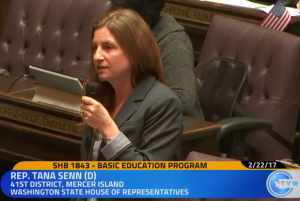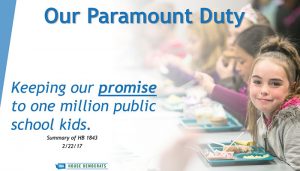Keeping our promise to one million school kids
 The House of Representatives voted today to approve HB 1843, a bill that would ensure our schools are fully funded and that every child receives opportunities to learn.
The House of Representatives voted today to approve HB 1843, a bill that would ensure our schools are fully funded and that every child receives opportunities to learn.
Every element of the House bill was driven by the question – What’s best for kids? – which is why I was a proud YES vote for HB 1843.
During today’s debate on the House floor, I stood up to protect local school district’s control over their funding. I urged the House to vote down an amendment that would restrict levies, which are used to fund programs beyond basic education. Whether it’s robotics and STEM classes, music or mental health, school districts know how to best meet the needs of each student.
Closing the opportunity gap
Our plan takes a significant step toward closing the opportunity gap and improving student outcomes in Washington state by making new investments in:
- Parent-involvement coordinators and guidance counselors
- Learning assistance to help struggling students keep up with their peers
- Transitional programs to help bilingual students
- Class-size reductions for career and technical education
A high quality teacher in every classroom
It also addresses the teacher-shortage crisis through educator recruitment and retention investments. The bill makes a serious commitment to our educator workforce by paying new teachers a fair salary, providing additional professional learning opportunities, and ensuring their compensation keeps up with market rates.
The Senate Republican plan is wrong for kids
 Unfortunately, the bill that came out of the Senate on a party-line vote has some troubling provisions that I cannot support. The Senate Republican bill:
Unfortunately, the bill that came out of the Senate on a party-line vote has some troubling provisions that I cannot support. The Senate Republican bill:
- Cuts learning support services for low-income kids.
- Reduces teacher pay over time, or increases class sizes. Or both.
- Eliminates local levies for a year, which will significantly impact afterschool programs, sports, clubs, music, and other locally-approved education enhancements.
- Reduces local levy capacity by about two-thirds.
Both sides agree new revenue is needed
Neither plan can be done within existing revenue sources. Democrats and Republicans agree new revenue sources are needed to solve this problem.
 The House plan is estimated to cost roughly $7.5 billion over the next four years. In the coming weeks, lawmakers will be unveiling ideas to pay for this proposal. Ideas that have been discussed previously include taxing corporate polluters or capital gains of wealthy investors, and eliminating wasteful tax exemptions.
The House plan is estimated to cost roughly $7.5 billion over the next four years. In the coming weeks, lawmakers will be unveiling ideas to pay for this proposal. Ideas that have been discussed previously include taxing corporate polluters or capital gains of wealthy investors, and eliminating wasteful tax exemptions.
The Senate Republican plan is estimated to cost $8.8 billion over the next four years. Their plan largely relies on a massive property tax hike on seniors, middle-class and working families, mostly in King County and the Puget Sound region. And even with their property tax increase, their plan still falls roughly $2.5 billion short of balancing, meaning Republicans must propose cuts to other state services like higher education, public safety, foster care, low-income health care, and housing. I will stand against this and continue to support the safety net and higher education, because we cannot solve the problem of fully funding education by eliminating other essential services.
The Path Forward
Now that each side has offered proposals, negotiators will work on a path toward compromise that will ensure public schools are fully funded for Washington’s one million school kids.
In the meantime, the legislature needs to move forward and pass HB 1059, also known as the levy cliff bill. The House passed the bill 29 days ago and we are still waiting on action in the Senate. When we fully fund education, measures like the levy cliff bill will not be necessary, but for now we need to make sure schools can plan their budgets for the upcoming school year.
I’ll keep you updated throughout this process, but in the meantime if you have comments, questions or ideas, feel free to reach out!
Sincerely,

Rep. Tana Senn
